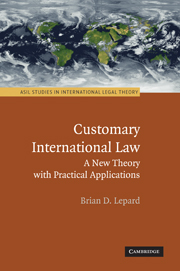Book contents
- Frontmatter
- Contents
- Figures
- Acknowledgments
- Cases
- PART ONE THE ENIGMAS OF CUSTOMARY INTERNATIONAL LAW
- PART TWO FOUNDATIONS OF A NEW THEORY OF CUSTOMARY INTERNATIONAL LAW
- PART THREE RESOLVING THE CONCEPTUAL ENIGMAS OF CUSTOMARY INTERNATIONAL LAW
- PART FOUR RESOLVING THE PRACTICAL ENIGMAS OF CUSTOMARY INTERNATIONAL LAW
- PART FIVE SOME APPLICATIONS OF THE THEORY
- 21 International Rules on Allocating Income for Tax Purposes
- 22 International Human Rights Law in General
- 23 Determining the Customary Law Status of Specific Human Rights
- 24 The Right to Change One's Religion or Belief
- PART SIX THE FUTURE OF CUSTOMARY INTERNATIONAL LAW
- Bibliography
- Index
24 - The Right to Change One's Religion or Belief
Published online by Cambridge University Press: 05 June 2012
- Frontmatter
- Contents
- Figures
- Acknowledgments
- Cases
- PART ONE THE ENIGMAS OF CUSTOMARY INTERNATIONAL LAW
- PART TWO FOUNDATIONS OF A NEW THEORY OF CUSTOMARY INTERNATIONAL LAW
- PART THREE RESOLVING THE CONCEPTUAL ENIGMAS OF CUSTOMARY INTERNATIONAL LAW
- PART FOUR RESOLVING THE PRACTICAL ENIGMAS OF CUSTOMARY INTERNATIONAL LAW
- PART FIVE SOME APPLICATIONS OF THE THEORY
- 21 International Rules on Allocating Income for Tax Purposes
- 22 International Human Rights Law in General
- 23 Determining the Customary Law Status of Specific Human Rights
- 24 The Right to Change One's Religion or Belief
- PART SIX THE FUTURE OF CUSTOMARY INTERNATIONAL LAW
- Bibliography
- Index
Summary
INTRODUCTION
I now turn to a specific case study involving the legal status of a particularly controversial human right: the right to change one's religion or belief. Kevin Boyle has observed in this connection that the “best known and most discussed aspect of freedom of religion is whether it can ever be legitimate to place restraints on the individual acting to abandon altogether a religion to which he or she was committed and to replace it with either another religion or with other beliefs, for example, secular beliefs.”
This right is under serious challenge today. For example, many Muslim countries restrict the right of Muslims to change their religion, deeming a change of religion by a Muslim “apostasy,” which is punishable by death according to interpretations of Islamic shari'a law. Various Indian states have enacted “anti-conversion” laws aimed at “protecting” the Hindu majority from activities undertaken by members of other religions to seek new converts.
The Special Rapporteur of the United Nations (U.N.) on Freedom of Religion or Belief, Mrs. Asma Jahangir, has observed that in a variety of countries the “punishment for conversion can consist of arrest and trial for ‘apostasy’, imprisonment, and sometimes the death penalty.” She states, moreover, that in “some countries, legislation prohibits conversion without prior notification of the authorities or defines ‘forcible’ conversion in broad terms.”
- Type
- Chapter
- Information
- Customary International LawA New Theory with Practical Applications, pp. 346 - 368Publisher: Cambridge University PressPrint publication year: 2010



